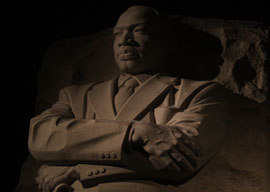
August 29, 2013

Martin Luther King Jr. monument, Washington D.C.
Source: Shutterstock
This week marks the fiftieth anniversary of Martin Luther King’s “I Have a Dream” speech. I have no recollection of the 1963 event myself, but I have good excuses for not remembering: (A) This was not my country at the time; and (B) I was in the Styrian Alps.
Well, this is my country now, and I’m bound to respect the national totems, of which King’s speech is certainly one, so don’t be looking for any ruthless deconstruction of the thing from me. I am merely going to compare King’s time with ours.
First, that was an America supremely confident in our ability to do anything. We had come out of the 1940s bursting with pride and vigor into a world where our competitor nations lie in ruins. Everything was possible! The USA was buzzing with energy, creativity, and wealth. Heck, we could even go to the moon!
Thus Martin Luther King:
…we refuse to believe that the bank of justice is bankrupt. We refuse to believe that there are insufficient funds in the great vaults of opportunity of this nation.
Most of us would think it in bad taste to talk like that in a time of seventeen trillion dollars of national debt and a looming entitlements overhang. And we sure won’t be going back to the moon anytime soon. These are more sober times, with lower hopes and expectations.
Second, we are a lot less religious now than we were then. King’s biblical diction, those quotes from Amos and Isaiah, would be lost on hearers nowadays. Blacks are still more religious than nonblacks, but even black leaders”even Sharpton and Jackson”don’t talk like King anymore, not outside church anyway. Barack Obama sure doesn’t.
(American friends of the older generation tell me that even at the time, educated blacks made fun of King’s rhetorical style. Those blacks were yuppie agnostics, scornful of Bible-quoting Southern rubes. A lot of them, including some senior figures in King’s entourage”notably Jack O’Dell“were members of the Communist Party.)
Third, King made it sound a lot easier than it turned out to be. He was reaching for low-hanging fruit: segregation laws, voting tests, police brutality. King’s listeners believed that once those obstacles were swept away, blacks would rise to equality with whites.
Well, the obstacles were swept away, and then some. Not only was discrimination against blacks outlawed; discrimination in their favor was legislated across major areas of American life”in college admissions and in government hiring, promotion, and contracting.
Yet the equality didn’t happen. Huge differentials in crime, academic achievement, and wealth accumulation remained. In some cases, they increased.
The best-documented crime is homicide, where there is a corpse to be accounted for: Blacks commit homicide at seven to eight times the nonblack rate, according to statistics published by Eric Holder’s Department of Justice. In academics, every measure”from NAEP to LSAT (Figure 14)”shows black mean scores a full standard deviation below the nonblack means. For median household wealth, the Census Bureau reports whites at twenty times the black level, and this gap seems to be widening.